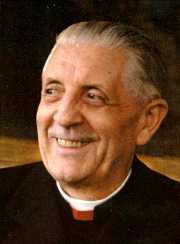Leo Jozef Suenens
|
His Eminence Leo Jozef Suenens |
|
|---|---|
| Cardinal, Archbishop of Mechelen-Brussel Primate of Belgium |
|
 |
|
| See | Mechelen-Brussel |
| Installed | 24 November 1961 |
| Term ended | 4 October 1979 |
| Predecessor | Jozef-Ernest van Roey |
| Successor | Godfried Danneels |
| Other posts | Auxiliary Bishop of Mechelen (1945–61) |
| Orders | |
| Ordination | 4 September 1927 |
| Consecration | 16 December 1945 |
| Created Cardinal | 19 March 1962 |
| Personal details | |
| Born |
16 July 1904 Ixelles, Belgium |
| Died | 6 May 1996 (aged 91) Brussels, Belgium |
|
Styles of Leo Jozef Suenens |
|
|---|---|
 |
|
| Reference style | His Eminence |
| Spoken style | Your Eminence |
| Informal style | Cardinal |
| See | Mechelen-Brussel |
Leo Jozef Suenens (pronounced SOO-nens) (16 July 1904 – 6 May 1996) was a Belgian prelate of the Roman Catholic Church. He served as Archbishop of Mechelen-Brussel from 1961 to 1979, and was elevated to the cardinalate in 1962.
Suenens was a leading voice at the Second Vatican Council and advocated aggiornamento in the Church.
Leo Suenens was born at Ixelles, the only child of Jean-Baptiste and Jeanne (née Jannsens) Suenens. He was baptised by his uncle, who was also a priest. Losing his father (who had owned a restaurant) at age four, Leo lived with his mother in the rectory of his priest-uncle from 1911 to 1912. Wealthy relatives wanted him to study economics and manage their fortune, but he chose the priesthood. He studied at Saint Mary's Institute in Schaerbeek and then entered the Pontifical Gregorian University in Rome in 1920. From the Gregorian he obtained a doctorate in theology and in philosophy (1927), and a master's degree in canon law (1929). Suenens had taken as his mentor Cardinal Désiré-Joseph Mercier, who had also sent him to Rome.
Ordained to the priesthood on 4 September 1927 by Cardinal Jozef-Ernest van Roey, Suenens initially served as a professor at Saint Mary's Institute and then taught moral philosophy and pedagogy at the Minor Seminary of Mechelen from 1930 to 1940. He worked as a chaplain to the 9th artillery regiment of the Belgian Army in Southern France for three months, and in August 1940 he became vice-rector of the famed Catholic University of Louvain. When the Louvain's rector was arrested by Nazi forces in 1943, Suenens took over as acting rector, where he sometimes circumvented and sometimes openly defied the directives of the Nazi occupiers. Raised to the rank of Monsignor in October 1941, he was included on a list of thirty hostages who were to be executed by the Nazis, but the Allied liberation of Belgium occurred shortly before these orders could be carried out.
...
Wikipedia
